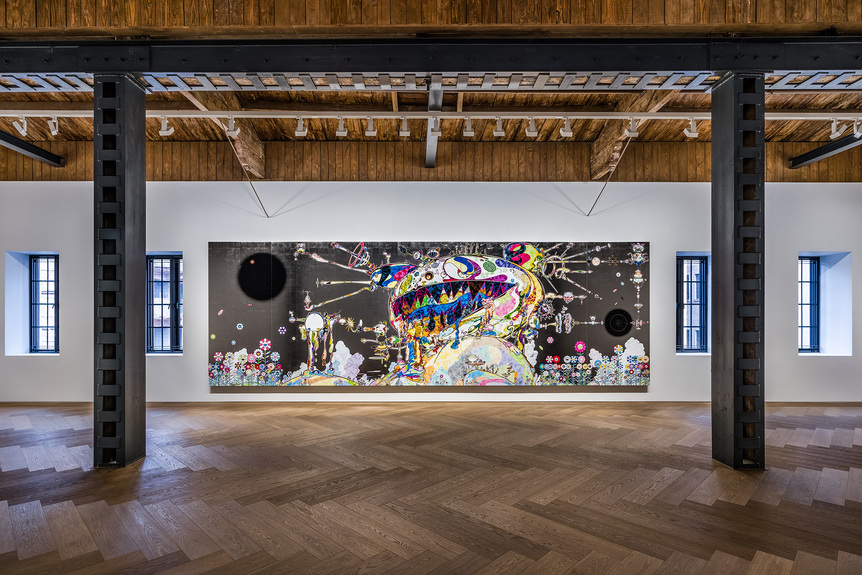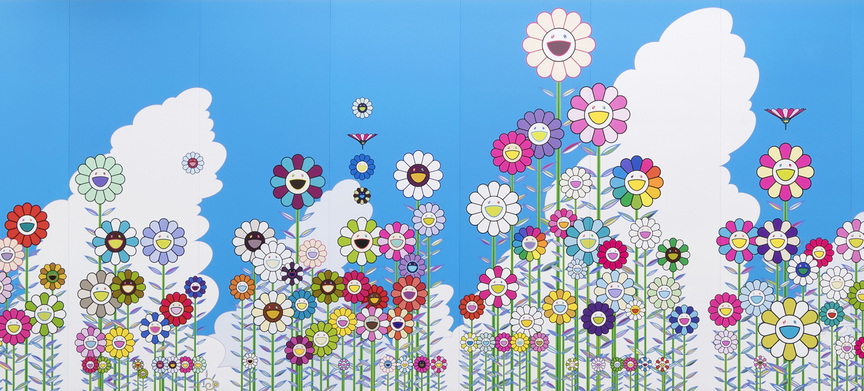-
From Current Issue
-
- Editor’s Letter Fire in the Heart
- Reviews I Gusti Ayu Kadek Murniasih
- Reviews 11th Seoul Mediacity Biennale: “One Escape at a Time”
- Dispatch Networked China
- One on One Monira Al Qadiri on Yukio Mishima
- Essays The rise of independent art spaces in pandemic-era Shanghai
- Features Tuan Andrew Nguyen
- Table of Contents
- Web Exclusives
- Archive
- Subscribe

R
E
V N
E
X
T
Installation view of TAKASHI MURAKAMI’s “Takashi Murakami in Wonderland” at Perrotin, Shanghai, 2018. Photo Yan Tao. Copyright 2018 Takashi Murakami/Kaikai Kiki Co., Ltd. All Rights Reserved. Courtesy Perrotin.
“Takashi Murakami in Wonderland” was Murakami’s first solo show in mainland China and Perrotin’s second exhibition in its posh 1,200-square-meter Shanghai space. According to Perrotin’s press release, it was also the artist’s largest gallery show in Asia to date, featuring recent and new works specially created for the occasion.
At the gallery’s third-floor entrance, visitors were greeted by a fiberglass-reinforced plastic wall sculpture of a gleaming, multicolored flower (all works Untitled and dated 2018). A well-recognized motif that the artist created over 20 years ago, this smiling, slaphappy icon has been depicted across a variety of media, from small tondo-shaped acrylic paintings—a number of these were interspersed throughout the gallery—to canvas sneakers, produced in collaboration with skateboarding footwear giant Vans in 2015.
Adjacent to the entryway were three large acrylic paintings with shimmering platinum and gold-leaf backgrounds that feature Murakami’s signature character Mr. DOB, whose name is the truncated form of the Japanese slang dobojite, meaning “why.” Mr. DOB appears somewhat sinister across the trio of canvases, hovering above a series of post-apocalyptic landscapes. In one of the works, which spans five meters in width, Mr. DOB is a fierce two-headed monster, facing opposite directions, with wide open mouths as if sucking up a cosmic cartoon universe or engaged in epic battle. In the largest of the three works, which stretches to seven meters, Mr. DOB becomes a monolith and part of the landscape itself, his chin resting on a small mountaintop in the painting’s foreground, contemplating two black holes drifting off against a silvery sky to the right and left sides of the painting. If there is any pizzazz to these paintings it’s due to their platinum and gold leaf grounds, combined with the vitality and methodical execution of imaginary narratives.
A single room was devoted to other manifestations of Mr. DOB. This emblematic stand-in for the artist himself has endured for over two decades, appealing to audiences familiar with and partial to popular youth culture. Referencing the aesthetics of manga or anime, Murakami’s Superflat style—seen in his work since the early days of his career—was a heady attempt to represent the infantilization of post-war Japan and contemporary society, but has now been subsumed as an outdated, superficial marketing buzzword rather than a concept with any bite.
Installation view of TAKASHI MURAKAMI’s (left) Untitled, 2018, acrylic and platinum leaf on canvas mounted on wood panel, diameter 150 cm; and (right) Untitled, 2018, acrylic and platinum leaf on canvas mounted on board, diameter 150 cm, at “Takashi Murakami in Wonderland,” Perrotin, Shanghai, 2018. Photo Yan Tao. Copyright 2018 Takashi Murakami/Kaikai Kiki Co., Ltd. All Rights Reserved. Courtesy Perrotin.
Installation view of TAKASHI MURAKAMI’s Kawaii Shop at “Takashi Murakami in Wonderland,” Perrotin, Shanghai, 2018. Photo Yan Tao. Copyright 2018 Takashi Murakami/Kaikai Kiki Co., Ltd. All Rights Reserved. Courtesy Perrotin.
There was also a kawaii merchandise shop installed inside the gallery where visitors could purchase plush flower pillows, print editions and other Murakami-designed items. At the exhibition’s opening, there was a long and eager line for the artist’s autograph on purchased goods, while others brought along their own Louis Vuitton-Murakami handbags or skateboards. From what I could tell, business was brisk.
In the third and final gallery, viewers were invited to stroll along a wall lined with happy-go-lucky wildflowers, and a monumental 15-meter-long painting (consisting of 15 panels) with a glossy blue sky and white, puffy clouds. A gold-leafed, fiberglass-reinforced plastic sculpture, standing at over two meters high, of an adult and child figure (of unidentified gender), holding hands with beaming grins and flower heads, cleverly suggests that they too have just stumbled upon this cheery flowerbed.
With all its cheek-pinching cuteness, one could say Murakami’s work has served to distract us from the unrelenting woes of the world. One could also easily argue that his works are merely gilded and grandiose byproducts pandering to the culture of luxury consumption—a culture of never enough. For a number of years now, Murakami has audaciously blurred the lines between contemporary cultural and subcultural trends, and between art and fashion. Whether he’s collaborating with Louis Vuitton, or, as he has been more recently, with fashion designer and music producer Virgil Abloh, Murakami’s deep-seeded entrepreneurial impulses have clearly driven his work from the beginning. “Making money is art and working is art and good business is the best art,” Andy Warhol famously said. Murakami has often been compared to Warhol for his business acumen (though they share little else in common). In Murakami’s wonderland, it’s business as usual.
Takashi Murakami’s “Takashi Murakami in Wonderland” is on view at Perrotin, Shanghai until January 5, 2019.
To read more of ArtAsiaPacific’s articles, visit our Digital Library.















